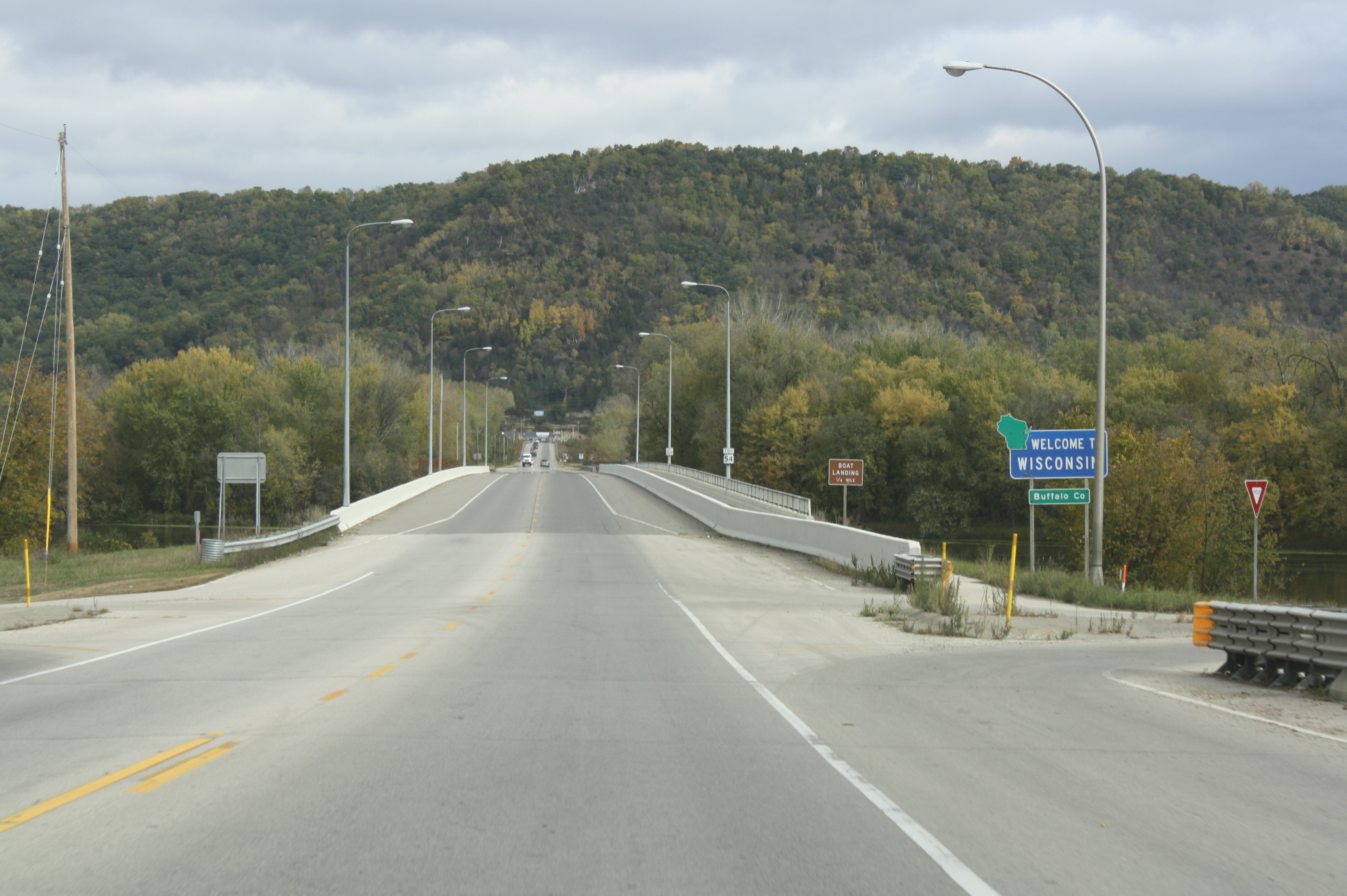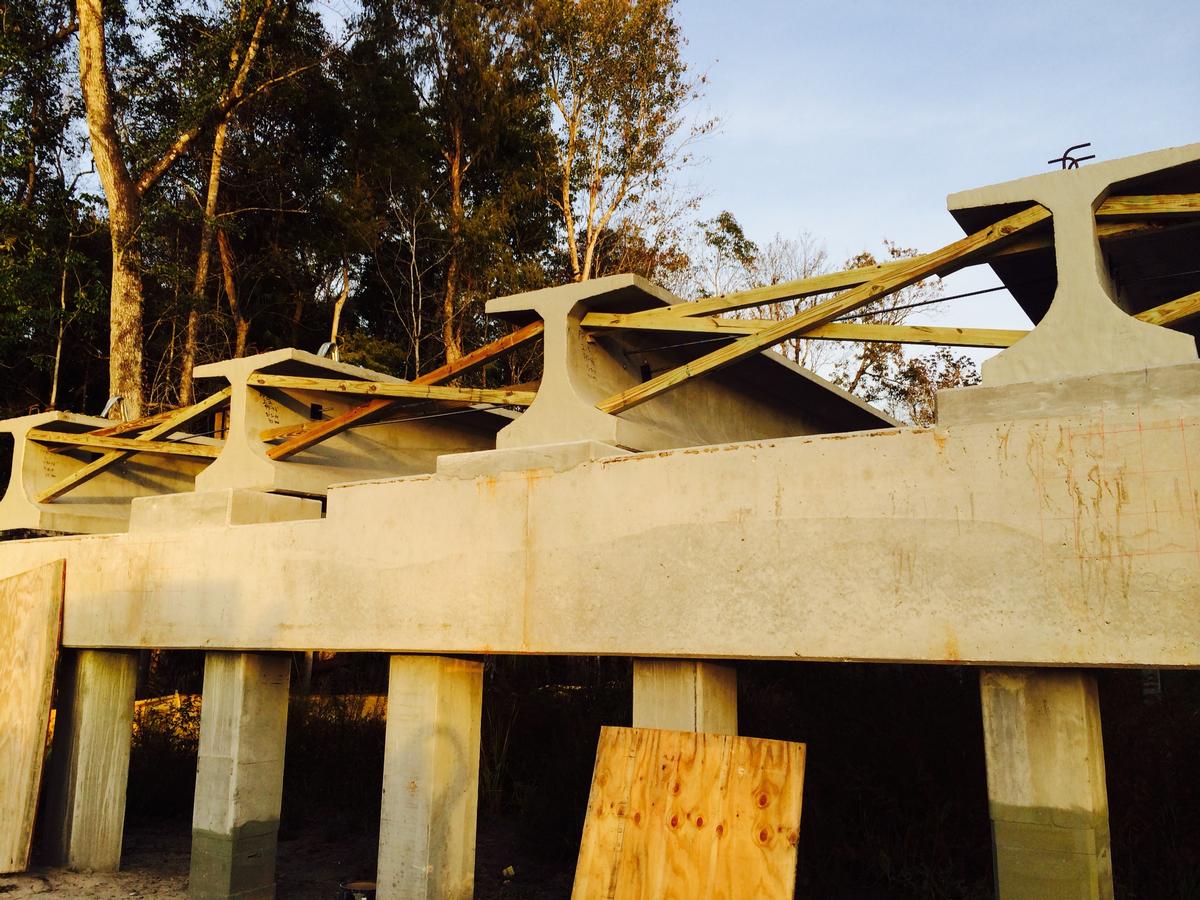|
Dresbach Bridge
The I-90 Mississippi River Bridge, or the Dresbach Bridge, consists of a pair of parallel bridges that traverse the Mississippi River, connecting the La Crosse, Wisconsin area to Dresbach in rural Winona County, Minnesota. The current bridge was fully opened to traffic in October 2016, replacing a previous 1967 plate girder bridge. It is part of the Interstate 90 route. There is another automobile crossing a few miles south of this bridge; the Mississippi River Bridge, a combination of two bridges, and the La Crosse West Channel Bridge, connecting La Crescent, Minnesota and La Crosse, Wisconsin. The bridge consists of a pair of parallel, concrete box girder structures over the main river channel and precast concrete girder structures over the back channels. The bridges were completed with a cost of $185.5 million, and have the following specifications: *100-year design life *Length: *Width: varies between *Two lanes each direction *Eastbound acceleration lane * outside s ... [...More Info...] [...Related Items...] OR: [Wikipedia] [Google] [Baidu] |
Mississippi River
The Mississippi River is the second-longest river and chief river of the second-largest drainage system in North America, second only to the Hudson Bay drainage system. From its traditional source of Lake Itasca in northern Minnesota, it flows generally south for to the Mississippi River Delta in the Gulf of Mexico. With its many tributaries, the Mississippi's watershed drains all or parts of 32 U.S. states and two Canadian provinces between the Rocky and Appalachian mountains. The main stem is entirely within the United States; the total drainage basin is , of which only about one percent is in Canada. The Mississippi ranks as the thirteenth-largest river by discharge in the world. The river either borders or passes through the states of Minnesota, Wisconsin, Iowa, Illinois, Missouri, Kentucky, Tennessee, Arkansas, Mississippi, and Louisiana. Native Americans have lived along the Mississippi River and its tributaries for thousands of years. Most were hunter-ga ... [...More Info...] [...Related Items...] OR: [Wikipedia] [Google] [Baidu] |
La Crosse Tribune
The ''La Crosse Tribune'' is a daily newspaper published in La Crosse, Wisconsin, covering the tri-state area of Wisconsin, Iowa, and Minnesota in the United States. The paper was first founded in 1904, following a media scandal in which existing publications failed to report on the recent creation of a power monopoly in La Crosse. Today, the paper is owned by Lee Enterprises and is part of the River Valley Media Group. History The first newspaper in La Crosse, ''Spirit of the Times'', was founded in 1852 by A.D. La Due. In the course of the next 50 years, a variety of daily newspapers emerged in La Crosse. Most of these were founded along political lines, which caused them to come in conflict with one another, such as the ''La Crosse Democrat'' and the ''La Crosse Daily Republican'', who notably circulated criticisms of the other’s reporting of Abraham Lincoln’s assassination. Many other papers catered to specific demographics, including two Norwegian-language publications, ... [...More Info...] [...Related Items...] OR: [Wikipedia] [Google] [Baidu] |
WIS 54
State Trunk Highway 54 (often called Highway 54, STH-54 or WIS 54) is a Wisconsin state highway running east–west across central Wisconsin. It is in length. Route description Minnesota state line to Plover WIS 54 begins at the western terminus. It crosses through the Minnesota state line at Winona, Minnesota via the North Channel Bridge. At this bridge, MN 43 ends there. After crossing the bridge, it soon turns east via WIS 35/Great River Road. In Centerville, WIS 35, as well as the Great River Road, turn southward; leaves the concurrency. At the same junction, WIS 93 joins the concurrency eastward. Further east, they then start to run concurrently with US 53 in Galesville. However, as they travel eastward, WIS 54 turns northeast, leaving the concurrency. At Butman Corners, WIS 54 then turns east again. After leaving Butman Corners, it closely parallels the Black River just south of the route. Then, it meanders eastward towards ... [...More Info...] [...Related Items...] OR: [Wikipedia] [Google] [Baidu] |
North Channel Bridge
The North Channel Bridge crosses the north channel of the Mississippi River between Latsch Island (part of Winona, Minnesota) and Buffalo County, Wisconsin. The bridge has a street setup, with one lane in either direction. It carries Minnesota State Highway 43 and WI 54 in either direction. Immediately to the southwest is the Main Channel Bridge. Images File:BuffaloCountyWisconsinWIS54WestTerminusBridge.jpg, Looking southwest along the center line File:North Channel Bridge centerline on Mississippi River from Buffalo County WI toward Winona MN.jpg, Looking northeast along the centerline See also * List of bridges documented by the Historic American Engineering Record in Minnesota *List of crossings of the Upper Mississippi River This is a list of all current and notable former bridges or other crossings of the Upper Mississippi River which begins at the Mississippi River's source and extends to its confluence with the Ohio River at Cairo, Illinois. Crossings Minneso ... [...More Info...] [...Related Items...] OR: [Wikipedia] [Google] [Baidu] |
I-90
Interstate 90 (I-90) is an east–west transcontinental freeway and the longest Interstate Highway in the United States at . It begins in Seattle, Washington, and travels through the Pacific Northwest, Mountain West, Great Plains, Midwest, and the Northeast, ending in Boston, Massachusetts. The highway serves 13 states and has 16 auxiliary routes, primarily in major cities such as Chicago, Cleveland, Buffalo, and Rochester. I-90 begins at Washington State Route 519 in Seattle and crosses the Cascade Range in Washington and the Rocky Mountains in Montana. It then traverses the northern Great Plains and travels southeast through Wisconsin and the Chicago area by following the southern shore of Lake Michigan. The freeway continues across Indiana and follows the shore of Lake Erie through Ohio and Pennsylvania to Buffalo. I-90 travels across New York by roughly following the historic Erie Canal and traverses Massachusetts, reaching its eastern terminus at Massachusetts Route 1A ne ... [...More Info...] [...Related Items...] OR: [Wikipedia] [Google] [Baidu] |
Lock And Dam No
Lock(s) may refer to: Common meanings *Lock and key, a mechanical device used to secure items of importance *Lock (water navigation), a device for boats to transit between different levels of water, as in a canal Arts and entertainment * ''Lock'' (film), a 2016 Punjabi film * Lock (''Saga of the Skolian Empire''), a sentient machine in the novels by Catherine Asaro * Lock (waltz), a dance figure * ''Locked'' (miniseries), Indian web miniseries * ''The Lock'' (Constable), an 1824 painting by John Constable * ''The Lock'' (Fragonard) or ''The Bolt'', a 1777 painting by Jean-Honoré Fragonard * ''Locks'' (album), by Garnet Crow, 2008 People *Lock (surname) *Ormer Locklear (1891–1920), American stunt pilot and film actor nicknamed "Lock" * George Locks (1889–1965), English cricketer *Lock Martin (1916–1959), stage name of American actor Joseph Lockard Martin, Jr. Places *Lock, Ohio, an unincorporated community in the United States *Lock, South Australia, a small town in the c ... [...More Info...] [...Related Items...] OR: [Wikipedia] [Google] [Baidu] |
List Of Crossings Of The Upper Mississippi River
This is a list of all current and notable former bridges or other crossings of the Upper Mississippi River which begins at the Mississippi River's source and extends to its confluence with the Ohio River at Cairo, Illinois. Crossings Minnesota Minnesota – Wisconsin Iowa – Wisconsin Iowa – Illinois Missouri – Illinois Confluence with the Ohio River (See List of crossings of the Lower Mississippi River) See also *List of crossings of the Lower Mississippi River *List of crossings of the Ohio River *List of crossings of the Missouri River *List of locks and dams of the Upper Mississippi River References Minnesota DOT County Maps External links [...More Info...] [...Related Items...] OR: [Wikipedia] [Google] [Baidu] |
I-35W Mississippi River Bridge
The I-35W Mississippi River bridge (officially known as Bridge 9340) was an eight-lane, steel truss arch bridge that carried Interstate 35W across the Mississippi River one-half mile (875 m) downstream from the Saint Anthony Falls in Minneapolis, Minnesota, United States. The bridge opened in 1967 and was Minnesota's third busiest, carrying 140,000 vehicles daily. It experienced a catastrophic failure during the evening rush hour on August 1, 2007, killing 13 people and injuring 145. The NTSB cited a design flaw as the likely cause of the collapse, noting that an excessively thin gusset plate ripped along a line of rivets, and that additional weight on the bridge at the time contributed to the catastrophic failure. Help came immediately from mutual aid in the seven-county Minneapolis–Saint Paul metropolitan area and emergency response personnel, charities, and volunteers. Within a few days of the collapse, the Minnesota Department of Transportation (Mn/DOT) planned its rep ... [...More Info...] [...Related Items...] OR: [Wikipedia] [Google] [Baidu] |
Cable Stayed Bridge
A cable-stayed bridge has one or more ''towers'' (or ''pylons''), from which cables support the bridge deck. A distinctive feature are the cables or stays, which run directly from the tower to the deck, normally forming a fan-like pattern or a series of parallel lines. This is in contrast to the modern suspension bridge, where the cables supporting the deck are suspended vertically from the main cable, anchored at both ends of the bridge and running between the towers. The cable-stayed bridge is optimal for spans longer than cantilever bridges and shorter than suspension bridges. This is the range within which cantilever bridges would rapidly grow heavier, and suspension bridge cabling would be more costly. Cable-stayed bridges were being designed and constructed by the late 16th century, and the form found wide use in the late 19th century. Early examples, including the Brooklyn Bridge, often combined features from both the cable-stayed and suspension designs. Cable-stayed ... [...More Info...] [...Related Items...] OR: [Wikipedia] [Google] [Baidu] |
Extradosed Bridge
An extradosed bridge employs a structure that combines the main elements of both a prestressed box girder bridge and a cable-stayed bridge. The name comes from the word ''extrados'', the exterior or upper curve of an arch, and refers to how the "stay cables" on an extradosed bridge are not considered as such in the design, but are instead treated as external prestressing tendons deviating upward from the deck. In this concept, they remain part of (and define the upper limit of) the main bridge superstructure. Compared to a cable-stayed or cantilever-girder bridge of comparable span, an extradosed bridge uses much shorter stay-towers or pylons than the cable-stayed bridge, and a significantly shallower deck/girder structure than used on the girder bridge. This arrangement results in the typical extradosed "look" of a fan of low, shallow-angle stay cables, usually with a pronounced "open window" region extending from the sides of each tower. The extradosed bridge form is mostly s ... [...More Info...] [...Related Items...] OR: [Wikipedia] [Google] [Baidu] |
Girder Bridge
A girder bridge is a bridge that uses girders as the means of supporting its deck. The two most common types of modern steel girder bridges are plate and box. The term "girder" is often used interchangeably with "beam" in reference to bridge design. However, some authors define beam bridges slightly differently from girder bridges. A girder may be made of concrete or steel. Many shorter bridges, especially in rural areas where they may be exposed to water overtopping and corrosion, utilize concrete box girder. The term "girder" is typically used to refer to a steel beam. In a beam or girder bridge, the beams themselves are the primary support for the deck, and are responsible for transferring the load down to the foundation. Material type, shape, and weight all affect how much weight a beam can hold. Due to the properties of the second moment of area, the height of a girder is the most significant factor to affect its load capacity. Longer spans, more traffic, or wider spacing o ... [...More Info...] [...Related Items...] OR: [Wikipedia] [Google] [Baidu] |







.jpg)
